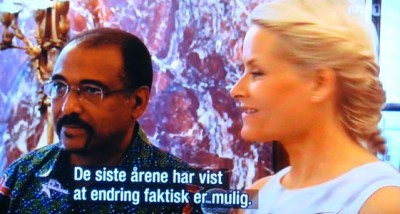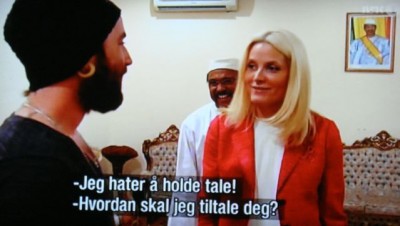Norwegian Broadcasting (NRK) wrapped up what newspaper VG called its two-part “miniseries” on Crown Princess Mette-Marit Sunday night, but not before it caught criticism for allegedly “glorifying” the royal family and spurning journalistic principles.

Gunnar Bodahl-Johansen of Norway’s Institute for Journalism (IJ) told VG that the program “didn’t come close to offering a portrayal of Mette-Marit with any depth.” He called the two-part series “very shallow” and an almost “sterile” portrait of the crown princess
“It was so glossy and idealized that I thought, ‘is this credible?'” Bodahl Johansen said.
Carl-Erik Grimstad, a political scientist who formerly worked at the Royal Palace, went further, likening NRK’s show to “a betrayal” of journalism. “You can’t call something a ‘portrait’ and think you can get away with interviewing only family and close friends,” Grimstad told VG. “There’s no good journalism in that.”
The first of the two-part series aired last Sunday evening, in prime time on NRK1, the nationwide channel. It included glowing testimonials about Mette-Marit, from her in-laws King Harald and Queen Sonja, her husband Crown Prince Haakon, her mother and brothers. There was a lack of critical remarks, with the crown princess’ family and friends mostly concentrating on how well she has developed during the 10 years since her royal marriage.

NRK was granted exclusive access to the royals to make the program, and allowed to follow Mette-Marit for more than a year. Bodahl-Johansen said that made it even more important that NRK should have sharpened its use of sources. “It’s seen as prestigious to get so close to the royals,” he said. “But as an independent broadcaster, NRK has to be careful not to make agreements that can hinder their journalism.”
NRK journalist Kristi Marie Skrede defended her shows by insisting they were not documentaries, rather a portrait, even though NRK’s own TV listings advertised the shows as dokumentar (a documenary) in local newspapers both weeks.
Skrede said the goal was to get Mette-Marit to open up. “Therefore it wasn’t natural to blend in critical voices, but concentrate on Mette-Marit and her closest family,” Skrede told VG.
“I always listen to criticism, but we chose to make another type of program than what Grimstad and Bodahl-Johansen had expected,” Skrede said. “I think we produced a varied picture of who she is as a person.”

The second program concentrated mostly on the crown princess as a student at a local business college and as a royal career woman, filming her on various foreign travels where she’s promoting HIV/AIDS measures, various public health issues and other social causes. NRK also followed her on official royal duties at home, like visiting local townships, along with her attendance at lavish royal affairs like the wedding last year of Sweden’s Crown Princess Victoria. The program seemed more balanced than the first, with King Harald admitting he has had to “correct” Mette-Marit on several occasions and stop projects he deemed inappropriate for the royal family. He was not pressed to go into detail.
Mette-Marit received more praise from those interviewed, including foreign aid colleagues as well as the king, who called her “incredibly good at coming in contact with people.” She was also described as a woman who insists on being her own boss.
Skrede said Crown Princess Mette-Marit answered all questions and put no limits on who NRK should interview. Skrede denied the royals had anything to do with the editing process, but admitted Crown Prince Haakon was allowed to visit NRK during editing work and “was granted insight” into the program before it was aired.
“I can assure you he did not ask that anything be taken out,” Skrede told VG. Asked what NRK would have done if he had, Skrede replied: “We would have listened if he had a point. When you’re making hour-long programs for prime time, we give consideration to the people who are telling their life stories. The crown prince knows Mette-Marit best of all. We take special consideration to what he, as father, says about the limits for how much we showed the children.”
Views and News from Norway/Nina Berglund
Please support our stories by clicking on the “Donate” button now:

